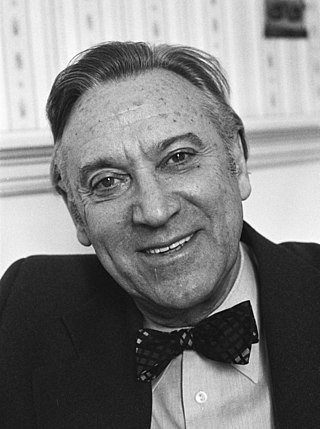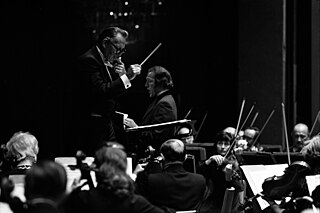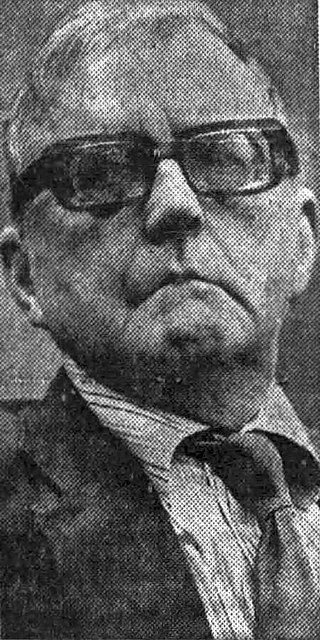
Dmitri Dmitriyevich Shostakovich was a Soviet-era Russian composer and pianist who became internationally known after the premiere of his First Symphony in 1926 and thereafter was regarded as a major composer.

Prince Igor is an opera in four acts with a prologue, written and composed by Alexander Borodin. The composer adapted the libretto from the early Russian epic The Lay of Igor's Host, which recounts the campaign of the 12th-century prince Igor Svyatoslavich against the invading Cuman ("Polovtsian") tribes in 1185. He also incorporated material drawn from two medieval Kievan chronicles. The opera was left unfinished upon the composer's death in 1887 and was edited and completed by Nikolai Rimsky-Korsakov and Alexander Glazunov. It was first performed in St. Petersburg, Russia, in 1890.

Kirill Petrovich Kondrashin was a Soviet and Russian conductor. People's Artist of the USSR (1972).

Esa-Pekka Salonen is a Finnish conductor and composer. He is the music director of the San Francisco Symphony and conductor laureate of the Los Angeles Philharmonic, Philharmonia Orchestra in London and the Swedish Radio Symphony Orchestra.
Dmitri Shostakovich composed his Symphony No. 4 in C minor, Op. 43, between September 1935 and May 1936, after abandoning some preliminary sketch material. In January 1936, halfway through this period, Pravda—under direct orders from Joseph Stalin—published an editorial "Muddle Instead of Music" that denounced the composer and targeted his opera Lady Macbeth of Mtsensk. Despite this attack and the political climate of the time, Shostakovich completed the symphony and planned its premiere for December 1936 in Leningrad. After rehearsals began, the orchestra's management cancelled the performance, offering a statement that Shostakovich had withdrawn the work. He may have agreed to withdraw it to relieve orchestra officials of responsibility. The symphony was premiered on 30 December 1961 by the Moscow Philharmonic Orchestra led by Kirill Kondrashin.

The Los Angeles Master Chorale is a professional chorus in Los Angeles, California, and one of the resident companies of both The Music Center and Walt Disney Concert Hall in Los Angeles. It was founded in 1964 by Roger Wagner to be one of the three original resident companies of the Music Center of Los Angeles County. Grant Gershon has been its music director since 2001, replacing Paul Salamunovich.

Ilya Ivanovich Ivanov was a Russian and Soviet biologist who specialized in the field of artificial insemination and the interspecific hybridization of animals. He is famous for his controversial attempts to create a human–ape hybrid by inseminating three female chimpanzees with human sperm.
Moscow, Cheryomushki is an operetta in three acts by Dmitri Shostakovich, his Op. 105. It is sometimes referred to as simply Cheryomushki. Cheryomushki is a district in Moscow full of cheap subsidized housing built in 1956, and the word is also commonly used for such housing projects in general.
The Festive Overture, Op. 96 is an orchestral work composed by Dmitri Shostakovich in 1954. Commissioned for the Bolshoi Theatre's celebration of the 37th anniversary of the October Revolution, the score has since become one of the most enduring of Shostakovich's occasional scores.
The Suite for Jazz Orchestra No. 1 by Dmitri Shostakovich was composed in 1934.

Dmitri Shostakovich composed his Sonata for Violin and Piano in G major, Op. 134 in the autumn of 1968 in Moscow, completing it on October 23. It is set in three movements and lasts approximately 31 minutes. It is dedicated to the violinist David Oistrakh, who premiered the work on May 3, 1969 in the Large Hall of the Moscow Conservatory.

Gerard McBurney is a British composer, arranger, broadcaster, teacher and writer.
The Centre for Russian Music is a research centre based at Goldsmiths, University of London. The main purpose of the centre is to promote research, publication and performance. It offers interdisciplinary activities focused on cultural, social, political and musical problems of Russian modern history and based on its archival collections. The Centre for Russian Music works in collaboration with the Serge Prokofiev Archive and the Alfred Schnittke Archive which contains manuscripts, facsimiles of all scores, private papers, sketches, photos, films, tapes of Schnittke's own performances and talks, all published scores, books and articles on Schnittke, and all existing recordings of his music. The Centre for Russian Music works under the supervision of an international board of advisors. Its director until 2014 was the cellist and musicologist Alexander Ivashkin. The Centre is used by researchers and students from many countries, and makes its materials available to any interested scholar. Current researchers included Blanc Wan.
The Big Lightning is an unfinished opera sketched in 1932 by Dmitri Shostakovich. The manuscript was found by Olga Digonskaya. Some of the musical material was borrowed from the earlier composition, Hypothetically Murdered, Op. 31. The music for the Big Lightning was eventually scrapped and reworked into Orango, because of his lack of confidence in the libretto. Shostakovich only managed to write the overture and eight following pieces, which lasts about 17 minutes. The original title may have been Nail in the Powder. The opera contains parodies of Glière's The Red Poppy, and Beethoven's Rage Over a Lost Penny.

The Gamblers, Op. 63, is an unfinished opera, composed by Dmitri Shostakovich in 1941/42 to his own libretto based on Nikolai Gogol's comedy The Gamblers (1842). The surviving first act lasts around 47 minutes. Krzysztof Meyer realised a completion in German, Die Spieler, in 1981. Both versions were performed on stage and recorded.

The Shostakovich competition is a classical music contest in chamber music performance. The two editions of the competition were held in 2008 and 2010 in Moscow, Russia. The contest was open to the participants of all countries in two categories: chamber music ensembles and piano duets. The Shostakovich Chamber Music Competition continued the line of musical contests named after Shostakovich and dedicated to the chamber music: e.g. Shostakovich String Quartet Competition in Moscow.

The Five Fragments, Op. 42 is a suite for small orchestra composed on June 9, 1935, by Dmitri Shostakovich. It was the only work, apart from film music, that he composed that year. He approached it as preparatory work for the composition of the final version of his Symphony No. 4.

Katyusha Maslova is an unfinished opera by Dmitri Shostakovich, with a libretto by Anatoly Mariengof, based on the novel Resurrection by Leo Tolstoy. Shostakovich received a commission from the Kirov Theatre to compose the opera in October 1940, while he was composing music for Grigori Kozintsev's production of King Lear. The first act of the libretto arrived in November, but further work was stalled because of preparations for the premiere of the Piano Quintet and the suicide of Mariengof's son. By the time work resumed in early 1941, Shostakovich had privately decided not to finish the opera.

Gogoliad, also referred to as Saint Petersburg Days, and Petersburg Tales, is an unfinished film score composed by Dmitri Shostakovich. It was intended for the namesake film that was to have been directed by Grigori Kozintsev.











